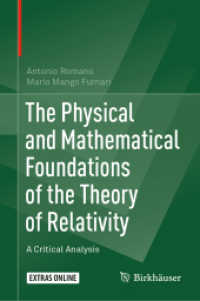Full Description
The rapid adoption of Artificial Intelligence in various industries and the emergence of Generative Artificial Intelligence (GenAI) in recent years have prompted highlighted interest in training and supporting university students to develop industry-oriented AI literacy competencies.
Effective Practices in AI Literacy Education serves as a go to guide for university key stakeholders, such as students, academics and professional support staff seeking to develop their AI literacy skills. Chapters provides the reader with applicable strategies and evidence-based practices through a comprehensive collection of international higher education case studies. The case studies offer innovative approaches in teaching AI literacy in a broad spectrum, and discipline specific approaches. Each case study is also complemented by the contributors' own reflections. The intention is to promote deeper engagement and critical thinking.
Effective Practices in AI Literacy Education sheds light on an under explored topic and helps the reader acquire a deeper understanding of the topic of current interest - AI literacy Education in higher education. It offers practical guidance and innovative solutions in this area through showcasing impactful case studies.
Contents
Foreword; Sean McMinn
Part 1. An Overview of AI Literacy Education in Higher Education
Chapter 1. Introduction; Thomas K.F. Chiu, Xianghan O'Dea, and Davy Tsz Kit Ng
Chapter 2. An Overview of Teaching AI Literacy to University Students; Julius T. Nganji, Lamis F. Al-Qora'n, and Kfukfu Nsangong
Chapter 3. AI literacy and GenAI Literacy Frameworks; Xianghan O'Dea and Davy Tsz Kit Ng
Part 2. Teaching AI Literacy to Staff and Students
Part 2.1. AI Preparedness for Staff and Educators
Chapter 4. Equipping the Next Generation: A Pre-service Teacher Education Program in Integrating AI Literacy across The Curriculum; Harshith B Nair - RETRACTED
Chapter 5. Academic Staff AI Literacy Development through LLM Prompt Training; Louise Drumm and Ashkan Sami
Chapter 6. A Framework-based Cross-institutional CPD for Academic Staff in Gen - AI Literacy, Critical Inquiry and Authentic Assessment; Roisin Donnelly and Ita Kennelly
Part 2.2. AI Literacy Training for Students across Subject Disciplines
Chapter 7. AI Literacy in Learning and Educational Technology; Andy Nguyen, Timofey Shalpegin, Joni Lämsä, and Ridwan Whitehead
Chapter 8. AI in Supply Chain Education; Timofey Shalpegin and Andy Nguyen
Chapter 9. Setting Standards: Developing AI Literacy Skills at Level 4; Aimee-Leigh Youngson and Vicki Harvey
Chapter 10. Evaluating a Global Citizenship Course on Developing Business Students' AI Literacy Skills; Anthony Chun Hin Ching, Sau Wai Law, and Davy Tsz Kit Ng
Chapter 11. From Data to Story: Leveraging LLM-powered Chatbots for Learning Business Data Analytics and Visualization in Mathematica; Fei Du, Jinwen Luo, and Sophy Xiaofei Wang
Chapter 12. Cultivating AI Literacy Skills: How GenAI Tools Prepare Students in Humanities and Social Sciences to Write with Ethical and Critical Insight; Yunying Yang, Miaoyan Yang, and Jinwen Luo
Chapter 13. Integrating Generative Artificial Intelligence into Teaching and Assessment: A Case Study from a University in the UK; Tadhg Blommerde, Elenia Charalambous, William Bright, Ellie Musgrave, Lilian Ueno, and Teagan Magee
Chapter 14. Effective Practices in AI Literacy Education: A Legal Education Perspective; Craig Smith
Part 3. Innovative Approaches in Teaching AI Literacy through Targeted Teaching Activities
Chapter 15. Learning AI Literacy in Collaborative Projects with an AI Education Tool by Making Machine Learning-Driven Apps: A case study from Finnish Pre-service Teacher Education; Jari Laru, Ismail Celik, Iiris Kivioja, and Kati Mäkitalo
Chapter16. Structured Integration of AI in Brand Management Education: A Constructivist Approach to Preventing Overreliance and Ensuring Active Engagement; Chahna Gonsalves
Chapter 17. Using Generative AI tools to Develop AI Literacy in the Context of Human-AI Collaborative Writing among Secondary Students; Xiaoxuan Fang and Hao Deng
Chapter 18. A Proposed Six-Step Human-AI Hybrid Argumentative Writing Framework in Higher Education: Enhancing Students' Prompt Engineering Techniques and Critical Thinking Skills; Yang Yin and Yan Jiahao
Chapter 19. Applied Generative AI for Interdisciplinary Projects; Jac Ka Lok Leung
Chapter 20. AI-Assisted Programming and AI Literacy in Computer Science Education; Chee Wei Tan, Mohammad Abdullah Matin Khan, and Pei-Duo Yu
Part 4. Conclusion
Chapter 21. Conclusion and Future Recommendations; Davy Tsz Kit Ng, Xianghan O'Dea, and Rong Tang








